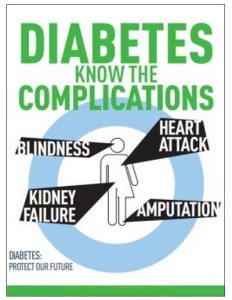
Diabetes mellitus, or simply diabetes, is a chronic disease that occurs when the pancreas is no longer able to make insulin, or when the body cannot make good use of the insulin it produces. There are 382 million people living with Diabetes. By 2035, 592 million people or one person in ten will have the disease.
People with diabetes have an increased risk of developing a number of serious health problems affecting the heart, blood vessels, eyes, kidneys, nerves and teeth.
Seeking medical advice and having regular blood sugar checks and tests for the complications of diabetes are all part of a good diabetes management as well.
A healthy lifestyle plays a huge role in staying healthy with diabetes. Several elements contribute to a healthy lifestyle:
- Healthy Food choices – Start by choosing foods that are low-fat, low processed carbs and emphasize on vegetables, fruit, and fiber. Choose low glycemic index foods that do not spike your sugars. Track your carbohydrates and control your portions – eat the right amount for a healthy diet and weight control
- Eat small meals REGULARLY – Eating large meals following long gaps creates hypoglycemia and then hyperglycemia. Instead, space your food intake throughout your waking hours by having smaller, more frequent meals and planned snacks at regular intervals, which can help keep your blood sugar at a steady level
- Choose healthy fats – Remove the “very bad fats” – transfats, hydrogenated oils and limit saturated fat. Choose the right portions of healthier fats like olives, avocados, nuts, flaxseeds
- Exercise – Regular exercise of 30 minutes a day helps with insulin utilization and helps stabilize sugar levels. This can be as simple as a walk or stroll outside or an activity you enjoy like tennis, swimming, cycling
- Learn to read food labels – Food labels are an essential tool for diabetic meal planning. Pay attention to the details on a food label, such as calories, total carbohydrates, fiber, fat, salt and sugar. Look at the ingredient list and look for healthy ingredients. Learning how to read food labels can help you make the best choices
- Don’t smoke – If you smoke or use other types of tobacco, ask your doctor to help you quit. Smoking increases your risk of various diabetes complications including heart attack, stroke, nerve damage and kidney disease
- Keep your blood pressure and cholesterol under control – Diabetes makes heart disease more likely, so keep a close eye on your blood pressure and cholesterol. Talk with your doctor about keeping your cholesterol, triglycerides, and blood pressure in check. Take medications as prescribed
- Manage Stress and get adequate sleep – Stress and diabetes don’t mix. Excess stress can elevate blood sugar levels. But you can find relief by sitting quietly for 15 minutes, meditating or practicing yoga
- Check your blood sugar levels twice daily and Hgb A1c test every 2-3 months
- See your doctor – Get a complete checkup at least once a year, though you may talk to your doctor more often. At your annual physical, make sure you get a dilated eye examination, blood pressure check, foot examination and screenings for other complications such as kidney damage, nerve damage, and heart disease.
